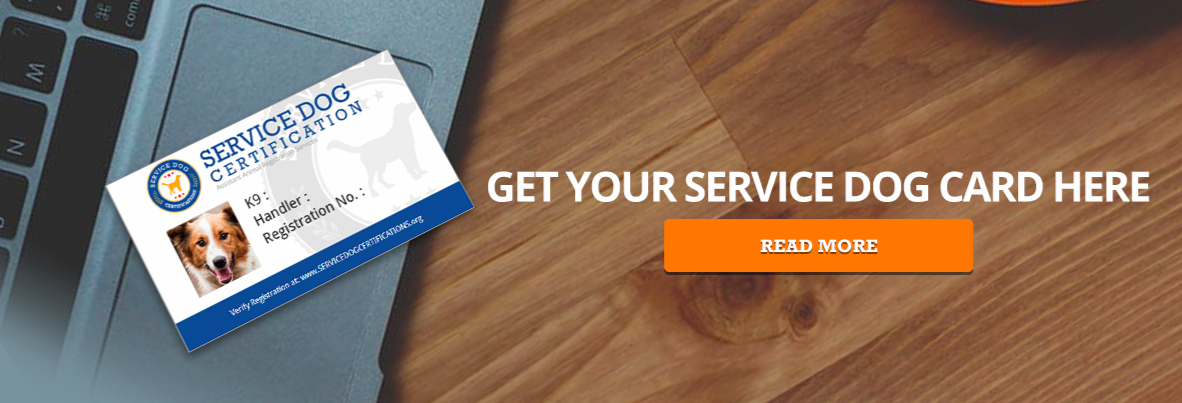Can I Take A Service Dog Into Work?

In 1990 The Americans with Disabilities Act (ADA) became a law to protect the rights of disabled individuals from facing discrimination. Before The Americans With Disabilities Act, Employers could refuse to hire an individual just because they had a disability. This ability to discriminate based on an individuals disability meant that regardless of an individuals ability to perform a particular job, employers could simply refuse to hire them because they were in a wheelchair. Thankfully with the passing of The Americans with Disabilities Act employers must provide reasonable accommodations to qualified individuals and they cannot refuse to hire them because they are disabled.
The ADA clearly states that under the law, individuals who require the assistance of a service dog are protected against discrimination and their service dog can accompany them anywhere the public is allowed. While disabled individuals who require the use of a service dog can bring a service dog to work with them, there are some limitations.
Service Dog Defined
First, it is important to understand what a service dog is, according to The Americans with Disabilities Act defines a service dog as “dogs that are individually trained to do work or perform tasks for people with disabilities.” Some tasks that service dogs perform include guiding the blind, alerting the deaf, retrieving objects for individuals in a wheelchair, or alerting and protecting an individual who has seizures. Because service dogs provide essential services for disabled individuals, they are protected under the law and must be allowed to accompany their handler wherever the general public is allowed to go. These rights extend to the workplace and employers are required to make reasonable accommodations for job applicants or employees.
Documentation
Service dogs do not require documentation such as doctor’s notes or therapist letters nor are they required to wear vests showing they are service dogs. Many individuals choose to have their service dogs wear vests because it makes them easier to identify and can avoid unnecessary problems when out in public. While under most circumstances a disabled individual is not required to show proof of their disability or identification proving their dog is a service dog when it comes to employment they may be asked how the dog helps them perform tasks directly relating to their job. This question can be as simple as describing what tasks their service dogs perform and how they are trained to behave in the workplace. One way to help an employer understand the functions the service dog provides is to ask for the dog to accompany them on a trial basis so the employer can observe how the dog interacts and behaves. This is not a violation of their rights under The Americans with Disabilities Act because the employer must make reasonable accommodations for the candidate/employee and their service dog, so they know what accommodations are required.

Exclusions
While the Americans with Disabilities Act was passed to help a disabled individual avoid discrimination in the workplace, some exclusions do apply. The law only applies to businesses that employ 15 or more people, and if the reasonable accommodation puts the employer under undue hardship, they can refuse to hire the disabled individual. Employers do not have to provide the exact accommodation requested by the employee or applicant if there are more than one accommodation available the employer can choose which one to provide. According to the U.S. Equal Employment Opportunity Commission; undue hardship includes accommodations that are too expensive or too difficult to provide due to the employer’s financial resources or size. Under the law, service dogs are allowed to accompany their handlers wherever the general public goes, and employers must make reasonable accommodations for employees who require service dogs, but there are some limitations to where a service dog can go and what dogs they can assist with.
For a disabled individual working in an office setting there should be no issue as their service dog can lay next to them at their desk and assist them with any tasks they may need, but for an individual who is a chef this accommodation may not only be against food handling guidelines, it may be dangerous for the service dog. Another place where accommodations for a service dog would be difficult would be for an individual who works in the intensive care unit in a hospital; their service dog may put patients at risk. While The Americans with Disabilities Act was passed to keep disabled individuals from being discriminated against, there are some cases where common sense should prevail, and it should be understood that there are certain work areas that a service dog may be excluded from.
Conclusion
The passing of The Americans with Disabilities Act had profound effects on how the disabled are treated including those requiring service dogs. Before the ADA disabled individuals, disabled individuals could be refused service, denied employment, and excluded from public transportation all because they were disabled. With the passing of the ADA reasonable accommodations must be made for disabled individuals including accommodations for service dogs. While there are a few jobs where service dogs may not be allowed (hospital ICU or restaurant kitchens), there are many jobs and careers that disabled individuals and their service dogs can work. Thanks to The Americans with Disabilities Act and service dogs, disabled individuals have gained more independence and the ability to pursue careers that in the past they may not have been able to do.
About the Author: The writing team at Service Dog Certifications is made up of folks who really know their stuff when it comes to disability laws and assistance animals. Many of our writers and editors have service dogs themselves and share insights from their own experiences. All of us have a passion for disability rights and animals.
Related Articles

Uber’s Service Animal Policy
Uber is working to make catching a ride easier, safer, and always a five-star experience. They connect the rider with affordable transportation anytime, anywhere, all at a tap of a button. You can also see your driver’s contact information and the vehicle’s details in the app, so you will always know you’re getting into the […]

Read More

Can I Take My Service Dog into the Movie Theater?
Under the Americans with Disabilities Act (ADA), service dogs must be allowed to accompany their handlers anywhere the general public is allowed to go, including movie theaters. According to the ADA “Service animals are defined as dogs that are individually trained to do work or perform tasks for people with disabilities.” Service dogs perform specific […]

Read More

Can I Take a Service Dog to College?
Service dogs are not just for the visually or hearing impaired individual. Service dogs have lent a helping paw to individuals with a broader range of physical and psychological conditions. But what if you are a student and need a service dog? Will colleges allow dogs on campus and into the classroom? Read on for […]

Read More


Hello,
I am a person with disabilities. I work in a small 3 office suite with 2 other therapists. After a month of working there, the newest therapist brought 2 dogs in without permission. I let her know that it was a “no animals” office and that I had severe allergies, asthma, and autoimmune disease and that the dogs would trigger a health crisis. She said she had a right to bring them because they were service animals. The barked constantly, ran around and became excited/agitated whenever someone came near. I contracted the landlord and he eventually had her remove them, but not before I became ill and missed work. Recently, (3 months later) the tenant is moving out; the landlord is letting out of her lease early because she has proven a terrible tenant in numerous ways. Again she brought a dog in without warning. This time, she allowed the dog to run around the entire suite including the waiting room. There was again no warning so that I could make arrangements for myself or unsuspecting clients. I had an asthma attack and had to leave early. I can’t go back until the place is relatively cleared of dander. The landlord will not clean until she is gone. I’ve had a loss of revenue and a disruption in the care of my counseling clients. Why do her obviously fake service animal trump my real disabilities?
This sounds like your landlord isn’t taking all of the necessary steps to handle the situation.
Your health needs do in fact matter. I would contact someone who is an expert in this type of situation for consultation and assistance.
Service dog should be VERY WELL TRSINED in all their tasks and needs to be forced on their job with their handler . Not ( jumping, barking, running around or being a bad un well behavior dog!! )
They too be focused & ready listen obey their master commands. This so un professional to REAL SERVICE DOGS.
I’m tired of COP trying to bully me into making my dog leave place.
How can I stop this.
You can request the police to remove the dogs on the grounds they are out of control and you fear for the safety of your patients. And since you cannot use the room you are paying for, withold rent the next month, put it towards the cleaning fee and notify your landlord in advance of your intentions in writing. get documentation of the cleaning and fees and submit copies to the landlord. He refused to resolve both a safety factor and a health risk to you and your clients so it’s on him. You can request that the other tenant be banned and evicted now on the grounds that she endangered you. Any health bills not covered by your insurance should be brought against the other tenant in small claims court for her to pay, since she refused to comply with your requests to remove the dogs.
The government better update the American with disabilities act because me and other people with disabilities are being given a hard time about my service dog being with me
My work is pressuring me for a note from a doctor and access to all my medical records. I don’t know what to do. I don’t want them to have access to my medical records. I feel that that’s not appropriate. I bring the dog maybe 2 days a week to work to help when I’m really having issues and stressing out. I was in a really severe motorcycle accident and some days are not really good. I have mild panic attacks at times since I got the dog. I have been feeling much better. He helps bring back my happiness. I’ve never owned an animal before this
Employers must accommodate employees that have a legitimate need for a service dog. No third-party is allowed to request specifics regarding your condition or medical history.
Hello I have mental illness that falls under the category of person with disabilities. I have been fighting with my work for months now about allowing my dog at work to assist me. She was certified as a ESA but now I am getting her certified as a PSD hoping this will force them to accommodate my needs. I struggle with panic attacks, dissociation, and impulsive behavior the most. Is this illegal for them to refuse? My job is working in an office, attending community events, and sometimes going into schools.
To turn an emotional support animal into a psychiatric service dog, the dog must be trained to perform a specific task relating to your disability. Under the ADA, your workplace can ask you two questions to verify your service dog: 1. Is the dog a service dog required for a disability? and 2. What work or task has the dog been trained to perform? For information on how to make your ESA a service dog, please see this link: https://www.servicedogcertifications.org/how-to-make-your-esa-a-service-dog